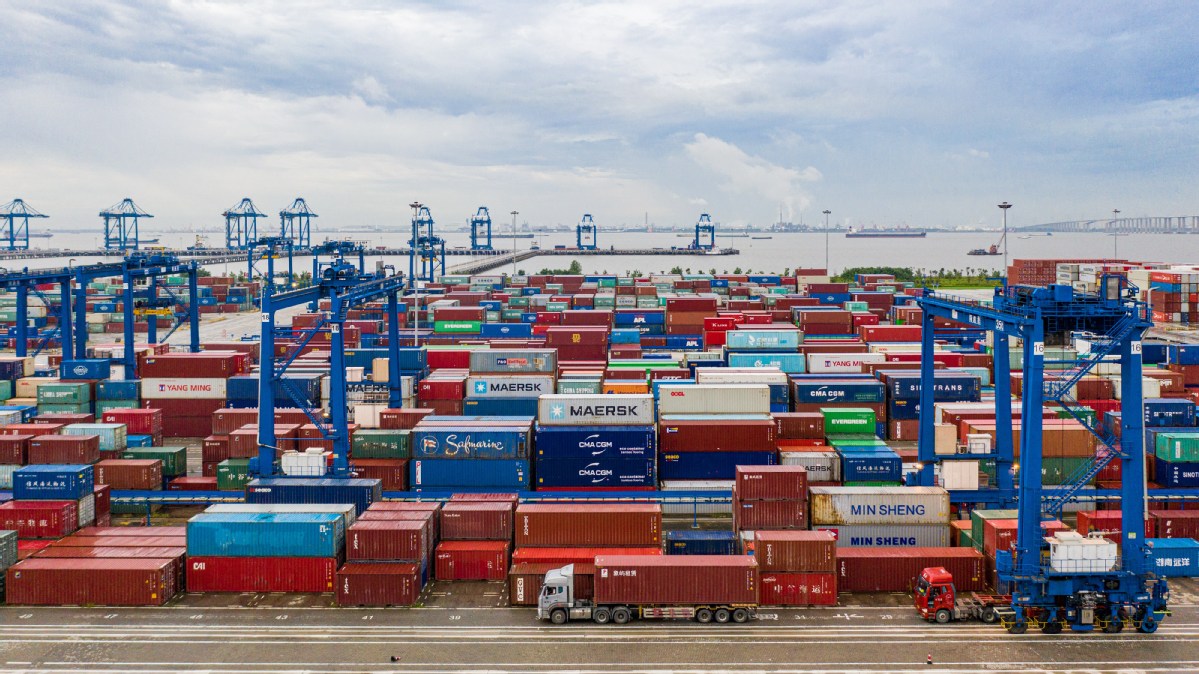
Production resumption in other countries likely to increase demand for nation’s products
China’s foreign trade is expected to reach a new high in the second half of the year, but probably at a slower yearly growth rate due to complexities at home and abroad, according to analysts and business leaders.
They also said it is important for the nation to steer toward the high-quality development of foreign trade, which means further optimizing the foreign trade structure.
Their comments came after China’s good foreign trade performance during the first half of the year, but also took account of the evolving domestic and foreign situations.
According to the General Administration of Customs, China’s foreign trade climbed by 27.1 percent year-on-year to 18.07 trillion yuan ($2.8 trillion) during the first half of this year, with exports increasing 28.1 percent year-on-year and imports rising 25.9 percent.
Liang Ming, director of the Institute of International Trade affiliated to the Chinese Academy of International Trade and Economic Cooperation, predicted that China’s total foreign trade for 2021 will hit more than $5.4 trillion, growing 16 percent from 2020, even under an extreme presumption of zero year-on-year growth for each month of the second half of the year.
The resumption in production in other countries will see “improving demand for higher-value-added products such as electric and intermediate products that China has comparative advantages in terms of producing”, Liang said, adding that imports will also gain steam as China’s economy keeps growing.
Stephen Fung, president of Hong Kong-headquartered supply chain solutions firm Fung Group in China, said since the vaccine-driven recovery continues to gain steam, the full reopening of major economies from pandemic-induced restrictions will further bolster overseas demand for Chinese products, both by retailers restocking their inventory to meet consumer demand and manufacturers importing machinery, equipment, and components from China.
However, Li Xingqian, director-general of the Ministry of Commerce’s Department of Foreign Trade, said at a recent media conference in Beijing that China’s foreign trade will face multiple uncertainties resulting from the pandemic and the fragile world economic situation.
He said that foreign trade growth would slow in the second half of 2021 due to the high base in 2020.
Liang said lingering high-level commodity prices, and a lack of hedging against risks caused by fluctuating exchange rates, also pose challenges to the healthy operations of China’s trading enterprises, especially small and medium-sized enterprises.
In addition, increased maritime freight prices and reduced port efficiency due to the pandemic have resulted in some Chinese enterprises being reluctant to accept overseas orders, amid concerns over prolonged delivery time frames and shipment failures, he added.
Wang Jun, chief economist at Zhongyuan Bank, said Chinese factories may face more pressure in material imports in the second half of this year.
A peak in commodity prices could not be ruled out in the second half of this year, because many upstream commodities, such as crude oil, nonferrous metals and iron ore, are mostly priced by developed countries, which can be affected by factors such as the US Federal Reserve’s monetary policy, the global economic situation, mismatches between supply and demand, and financial speculation, he said.
Song Yijia, chairwoman of Jiangsu S&S Intelligent Science and Technology Co Ltd, a private company engaged in high-end weaving equipment and key components, based in Shuyang, Jiangsu province, said the high import prices of major raw materials had put huge pressure on her business, as well as upstream and downstream supply chains across China, since last year.
“The rise of international bulk commodity prices and shipping costs sporadically lifted production costs,” she said.
“While overseas orders are flowing into China at a fast pace, it is vital for Chinese enterprises to form closer partnerships with upstream and downstream enterprises to ensure their profitability,” she added.
 DSTAR machine
DSTAR machine

WeChat
Scan the QR Code with wechat